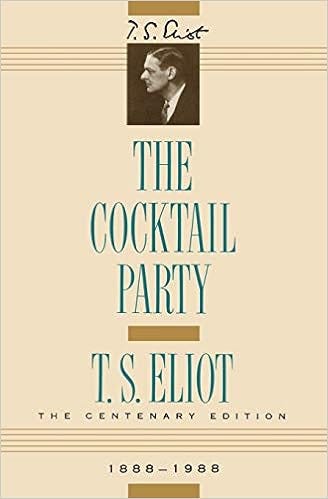Everything I Read in December 2019
In a world with fleeting social media hashtags, fake news, and specious political narratives, books provide a concrete foundation. Each book bestows a new layer of thinking, a new perspective and sentiment. Layering on stories, personalities, characters, and prose has enriched my understanding of people, places, and history.
This month, I read six books to end my year of reading, a year that spanned 54 books total. Much of my recent reading has been history, politics, and psychology, with a great deal of historical fiction and classics as supplement.
Let’s get into it. Here’s everything I read in December 2019.
The Cocktail Party by T.S. Eliot (1949)
A short yet brilliant play by the master poet T.S. Eliot. Conversation drives the entire plot. On the surface, the play seems lighthearted, a succinct sequence of conversations between people at a cocktail party.
As the play progresses, however, darker undertones emerge, commenting on the nature of loneliness and isolation between people and within couples.
Two of the main characters, a married couple on the brink of divorce, realize that they may not be perfectly suited for each other, yet spending their lives together will ultimately bring more meaning and reward than a life spent apart.
Justice: What’s the Right Thing to Do? by Michael J. Sandel (2008)
Legendary Harvard professor Michael J. Sandel rose to fame with his political philosophy lectures on YouTube in 2009 (all of which I would highly recommend). This book ties together his ideas in politics and moral philosophy in a digestible, intelligent manner.
Sandel discusses systems of thought ranging from John Stuart Mill’s Utilitarianism, Robert Nozick’s Libertarianism, Immanuel Kant’s categorical imperative, as well as ideas of Aristotle and John Rawls.
His ability to tie together disparate philosophies into a cohesive narrative-style book makes it a compelling and straightforward read for anyone with or without a background in philosophy or politics.
Have a Little Faith by Mitch Albom (2009)
Mitch Albom — one of my favorite authors — writes short and easy to read books, yet they consistently hit an emotional cord. This book shared many parallels with Tuesday’s with Morrie, Albom’s classic memoir of his dying professor.
Have a Little Faith is the story of Mitch Albom’s relationships with a dying Rabbi and an inner-city pastor who previously led a life of crime. The narratives are separate throughout the book, but each impart the notion that community, faith, and trust are the bedrock for moving forward in life.
“The story of my recent life.’ I like that phrase. It makes more sense than ‘the story of my life’, because we get so many lives between birth and death. A life to be a child. A life to come of age. A life to wander, to settle, to fall in love, to parent, to test our promise, to realize our mortality- and in some lucky cases, to do something after that realization.”
Bloodlands: Europe Between Hitler and Stalin by Timothy Snyder (2010)
The densest, most emotionally taxing book I’ve read in some time. Yale historian Timothy Snyder dissects the atrocities and genocides of World War II enacted by Hitler and Stalin’s mutual occupation of the countries between Germany and the Soviet Union.
Poland, Ukraine, Belarus, the Baltic States, and Romania are collectively coined as “Bloodlands” by Snyder, as he posits that no other region in the history of mankind has suffered more terror and bloodshed than here.
In brilliant fashion, Snyder also profiled Hitler and Stalin as individuals and their shortcomings in ideology and politics. Both were notorious for playing the victim and brutally ousting scapegoats; both enacted political ideology with religious fervor.
This was the most important book I read this month.
We Were the Lucky Ones by Georgia Hunter (2017)
A moving, tragic, and inspiring semi-autobiographical story of a family subjected to the terrors of the Holocaust.
The Kurc family is scattered in consequence of the German invasion of Poland in 1939. Two sons enlist in the Polish army; another son is trapped in France. Family members are strewn to distant lands and imprisoned in Soviet Gulag prison camps. Georgia Hunter details her own family history in a gripping narrative of survival, hope, and war. A heart-wrenching and bold account of a family ripped apart by circumstance and held together by love.
The Righteous Mind: Why Good People are Divided by Politics and Religion by Jonathan Haidt (2019)
Politics and religion: the two most divisive concepts in our world. Left and Right; Heaven and Hell; East and West — are these divisions arbitrary? Who is correct and who is wrong? Social psychologist Jonathan Haidt posits that there is a moral underpinning to religion and politics that can shed light on these matters, and also reconcile opposing views.
Haidt claims that, to enrich political discourse and reduce disagreement between parties, we must study morality and human nature to better understand why people think the way they do.
People, Haidt says, are fundamentally intuitive rather than logical — we make decisions before we rationalize them. So instead of trying to convince opposing groups of facts and policy, we should appeal to sentiment and moral values. By seeking out the moral and philosophical root of politics, we can avoid surface-level disagreements and better learn from each other.
Politics and religion don’t exist at the root of controversy. These are what manifest from our deepest intuitions, which cannot be explained with policy. While Snyder’s Bloodlands was the most important book I read this month, this book was by far my favorite.







